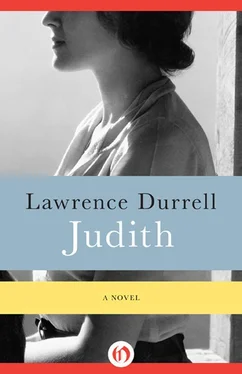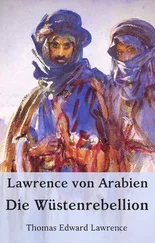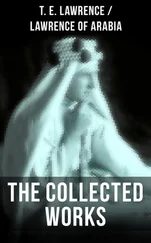“Funny old bugger,” said Donner later in the mess tent, as he drank a glass of beer among his compeers. “I hope he knows what he’s at.” By his standards, Towers was going to be “tricky” — too much of a gentleman by half, and a wog-lover obviously. That evening Daud sent for Towers. He was seated in a veritable sea of papers thrown about in higgledy piggledy fashion. The Palace pouch lay before him. “My brother says there will be war and we will have to take Ras Shamir,” he said, his face registering a strange mixture of emotions, joy, confusion and sorrow all at once.
“Your brother may be right,” said Towers soberly.
“Come,” said Daud abruptly, “come and walk.” It was as if he needed to sort out these conflicting emotions. They walked in silence along the rosy cliffs for a while; below them slumbered the silent valley of Ras Shamir, deep in violet mist. The lights of the mountain settlements twinkled like stars across the unguarded border. Daud was at a loss to understand why his heart sank at every mention of his brother’s name; it was not jealousy, for he loved Jalal deeply. It was something else. Jalal had been away, abroad, and this had somehow changed everything between them. He, Daud, had always been sickly, confined to his bed for long terms, too ill to risk a life in cold climates. He had never left his country. Indeed, it was much to his credit that he had learned as much as he had from the Palace tutors. His English was good though imprecise, and he could stumble in French. But Jalal! When he came back it was a different sort of Jalal. He was impatient and contemptuous of the old easy-going ways of his own people. He preferred foreign friends and foreign ways; he preferred the life of the court, with its intrigues, to the life here among the tents of the clan. Daud sighed heavily and took Towers’ arm. He pointed to the valley below them and said with a sudden little access of emotion: “Ach, Towers! Ras Shamir! We must have it again — we must have it.” He bit his white knuckle with whiter teeth. “You know it,” he said, almost pleadingly, his fine eyes swollen with a facile emotion. Towers delivered himself of a grunt. “My ancestors were born there,” continued Daud with a flowing gesture, “my family and line sprang from there. Now the Jews have it and we are here.” With his other arm he described an arc which followed out the contours of the desert, covered by day with their grazing flocks and brilliant tents. It was a surprising contrast: the brilliant moonlit valley below and the bare rufus cliffs on which they stood — stone shaling away immediately into sand and wave-worn rocky foothills.
“It was a swamp before,” Towers reminded the young man softly. Daud stood sunk in thought. “Now all the nations will be speaking about it with your leaders,” pursued Towers. He had had great difficulty in getting Daud to understand the workings of UNO and the nature of its deliberations. Daud nodded, solemnly biting his knuckle until it hurt him, until tears came into his eyes. “They will understand the Arabs’ feelings,” he said. “How great we are! Did the Arabs not invent mathematics? You yourself have said so, Towers, and you do not lie.” Towers agreed solemnly. But Daud was troubled. “But now they are speaking of a jihad , a holy war. The old King has told us to be ready — my brother says so. He has made you give us these wonderful cars.” He turned his great sentimental liquid eyes upon Towers. “And the astrologers say that in war I shall be invincible this year. But war, Towers… how could I think of war with them — with Aaron, my friend? That is what troubles me.” He hung his head and pulled at his lip. Then his face lit up with a smile. His white teeth flashed under his silky moustache and he struck his knee with his hand. “I have it. I shall ask Aaron to visit me, and we can speak of the matter like old friends. He will understand my feelings, Towers. He above all will understand.”
Towers looked quizzical but he did not reply directly. Indeed, there was nothing to say. He put his arm out and touched Daud’s wrist; a gesture of affection. They returned in silence.
“Well,” said Towers to himself as he got into bed, “I trust that I shall have retired before they start any jihad nonsense here. I think H.M.G. must be mad, quite mad. Broken promises on every side and a complete lack of any clear-cut policy. Never seen such a mess in a long career of soldiering. Never!”
The shoot the next morning was a great success, as indeed was the triumphal progress of Daud and his entourage by armoured car. Daud was flushed with pleasure and excitement and lost in admiration for these glorious instruments of war. But when, at a signal from Donner, they fired a few ranging shots with the heavy anti-tank guns they carried, he fairly pranced with joy. His clansmen clustered about them like honey bees; and when the machine guns opened up a rapid fire in concert they rolled on the ground with joy. The children fell down like snipe shocked by close gunfire, but screamed with laughter and rolled over and over in the sand. Daud pressed Towers’ calloused hand and then put it briefly to his cheek. “What wonders these are,” he said with his vivid, innocent smile. “They will make me invincible in battle, Towers.”
Then he added with a change of expression: “I have sent them to ask Aaron to come. I must see him, Towers. I know he will understand me.”
Indeed, that morning the lean figure of Abu Taib had crossed the border on his elegant black Arab, accompanied by an escort of two horsemen bearing pennons with white flags. They moved with speed and discretion down the defile, surprised and relieved to find that there were no guards and no checkpoints. Once on the greensward by the river, they let their steeds out and thundered across the water-meadows to bear Daud’s invitation to Aaron. The escort reined in and waited some five hundred yards from the perimeter, while the old man, with his spiky whiskers blowing, raced on up to the kibbutz. He was in luck, for Aaron happened to be there, and he was able to deliver his invitation couched in the correct terms — neatly turned phrases full of archaic flourishes. Aaron thanked him but hesitated. He looked serious, undecided, doubtful. He stared at the ground. “Well?” said Abu Taib with a hint of disappointment in his glance. “Will you come?” At last Aaron sighed and said he would.
It took a little time to saddle up a horse and accompany the old man back to the defile, a journey which they accomplished in silence. The jingle of harness must have alerted Daud, for he appeared in the doorway of his tent with his dark eyes wide with expectation and delight. The two men stood for a long moment looking at each other, then each cried the other’s name as they rushed into an embrace. It was almost like man and wife meeting, so tender was Daud’s embrace, so genuine the emotion of Aaron. Arms round each other, they turned back into the tent to complete the civil formalities of their meeting by an exchange of coffee, fruit and bread dipped in salt. Daud was like a child, beside himself with delight. “Oh Aaron, I knew you would come. I knew it. I knew it.” He stroked his friend’s arm, pinched his cheek. “So we could speak of everything and settle everything without anger. Before God, how could I have anger for you, my friend? Oh Aaron, you understand, don’t you?” And, before Aaron could reply, he placed a sugar-dusted loucoum between his lips. “The nations are speaking of us Arabs,” went on Daud incoherently. “They will grant us back… Aaron, the valley I must have once more. Come.” Impulsively he led his friend across the dunes towards the steep cliffs which overlooked Ras Shamir. “I am to be invincible in war and games of skill. Oh Aaron, is it not marvellous, my friend? But we will arrange everything in peace and amity. Your people shall go in peace, with presents, and not a hair of the head harmed. I promise you. Do you see, my dear friend?”
Читать дальше












